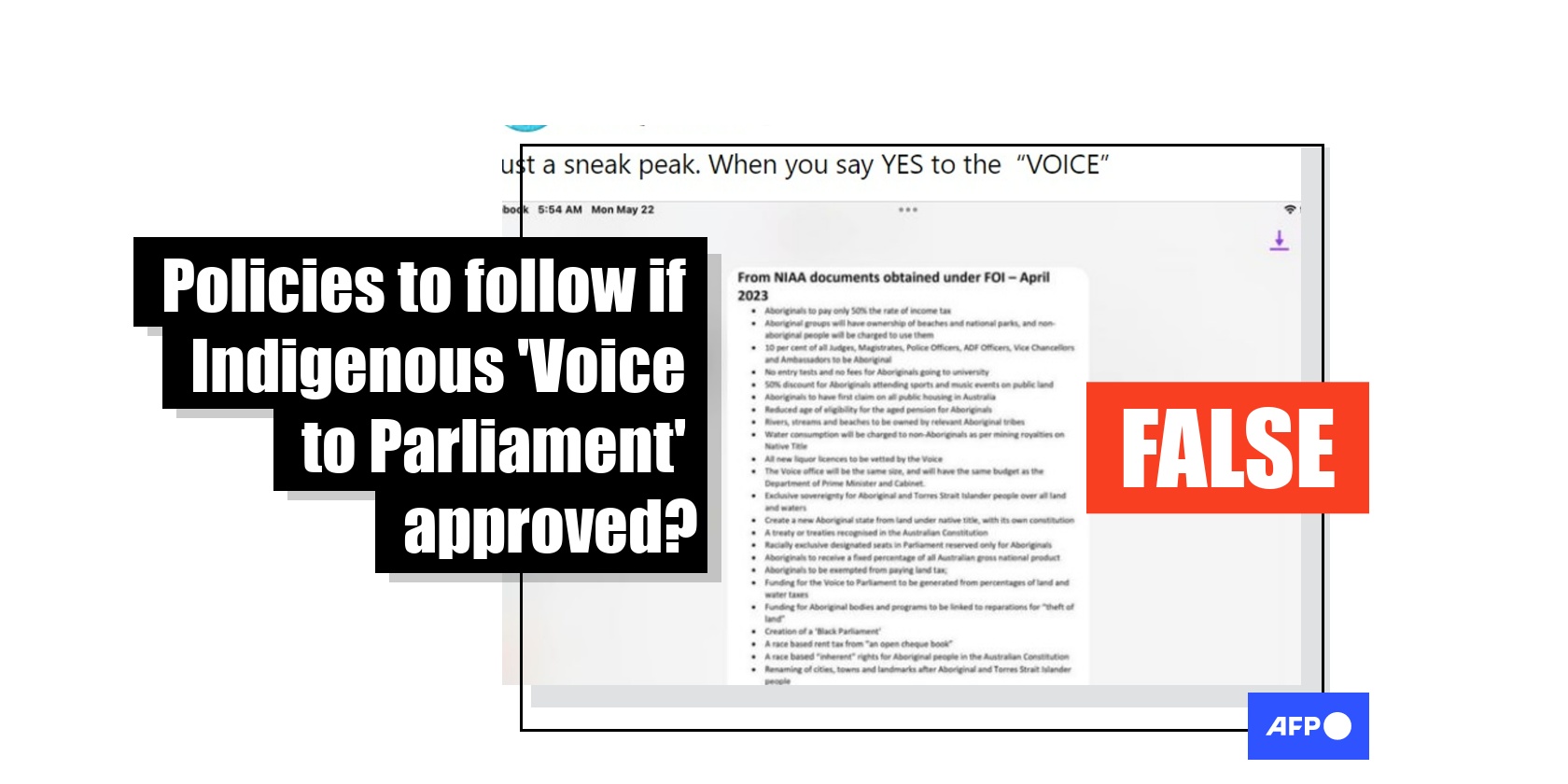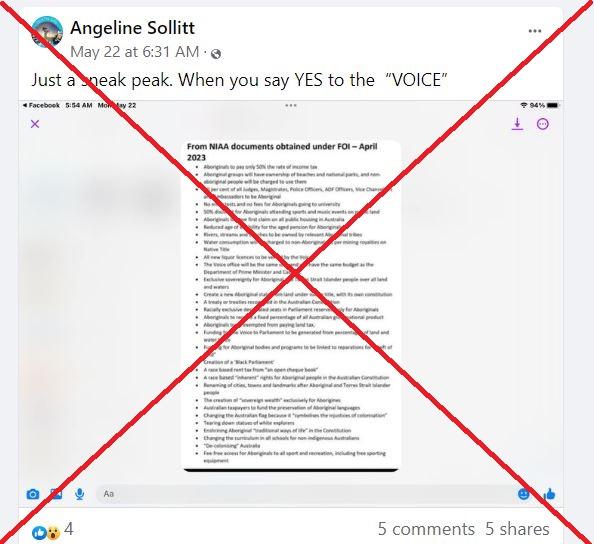
Paper shows ideas from Indigenous Australians, not policies in Aboriginal 'voice' referendum
- This article is more than two years old.
- Published on June 20, 2023 at 04:15
- 3 min read
- By Kate TAN, AFP Australia
"Just a sneak peak. When you say YES to the 'VOICE'", reads the caption to the screenshot shared on Facebook here on May 22, 2023.
A referendum to give Australia's Indigenous peoples a voice on laws that affect them is expected at the end of 2023 after parliament passed referendum legislation on June 19 (archived link). This will take the form of an advisory body, to be called the Aboriginal and Torres Strait Islander Voice (archived link).
The screenshot included in the Facebook post shows a bulleted list titled "From NIAA documents obtained under FOI - April".
The National Indigenous Australians Agency (NIAA) is a government agency set up in 2019 with the aim of improving the lives of Aboriginal and Torres Strait Islander peoples; it is also heavily involved in the preparation of the referendum (archived link).
There are 31 items in the list, including policies such as "Aboriginals to pay only 50% the rate of income tax" and "Exclusive sovereignty for Aboriginal and Torres Strait Islander people over all land and waters".

The list has also been shared more than a hundred times elsewhere on Facebook here, here and here.
But the items on the list being circulated on social media are unrelated to the referendum that Australians will vote on.
The purported policies mentioned in the list were spoken about in parliament by Senator Pauline Hanson, leader of the hard right One Nation Party, on March 29 during a speech in which she outlined her opposition to the "Voice to Parliament" (archived link).
Attempt to 'provoke fear'
However, Harry Hobbs, a law professor at the University of Technology Sydney, told AFP the list "has nothing to do with the 'voice' referendum" (archived link).
Some of the items on the list "appear to be included as a way to provoke fear about the consequences of voting yes in a referendum," he added on June 15.
The referendum will ask Australians whether Indigenous Australians -- whose ancestors have lived on the continent for at least 60,000 years -- should have a constitutionally enshrined right to be consulted by the government on laws that impact their community.
"The parliament and government will be under no obligation to adopt any policies proposed by the 'voice'," Hobbs added.
Expert advice made available by the Australian government also shows the executive would not be obligated to follow the suggestions given by the 'voice' (archived link).
First Nations Regional Dialogues
A search of the NIAA's Freedom of Information disclosure log found only one document was released in April, but the contents make no mention of the "voice" (archived link).
Another document from March, labelled FOI/2223/016, does mention some of the items listed on the false Facebook post (archived link).
It was compiled in response to a request for detailed records of meetings in 2016 and 2017 with Indigenous Australians called the First Nation Regional Dialogues to discuss constitutional recognition (archived link).
For example, the document -- citing a meeting from a dialogue in Brisbane in April 2017 -- notes the suggestion that the Voice to Parliament should be funded through "a percentage of taxes (land taxes, water taxes)".
The list in the false Facebook post, meanwhile, says "funding for the Voice to Parliament to be generated from percentages of land and water taxes".'
Another item on the Facebook list suggests, "Aboriginals to receive a fixed percentage of all Australian gross national product."
This suggestion is also mentioned in the NIAA document here as part of a discussion about the possibility of pursuing a treaty.
University of New South Wales law professor Gabrielle Appleby told AFP on June 16 these records reflect the wide diversity of views on constitutional recognition, including the pros and cons of different proposals and the reality of what is politically possible (archived link).
She said the "voice", if established, "does not guarantee any special rights for Aboriginal and Torres Strait Islander people, such as land rights, or a fixed percentage of GDP, or exemption from income tax".
"Any substantive rights will have to be granted through the ordinary parliamentary process."
Copyright © AFP 2017-2026. Any commercial use of this content requires a subscription. Click here to find out more.
Is there content that you would like AFP to fact-check? Get in touch.
Contact us
